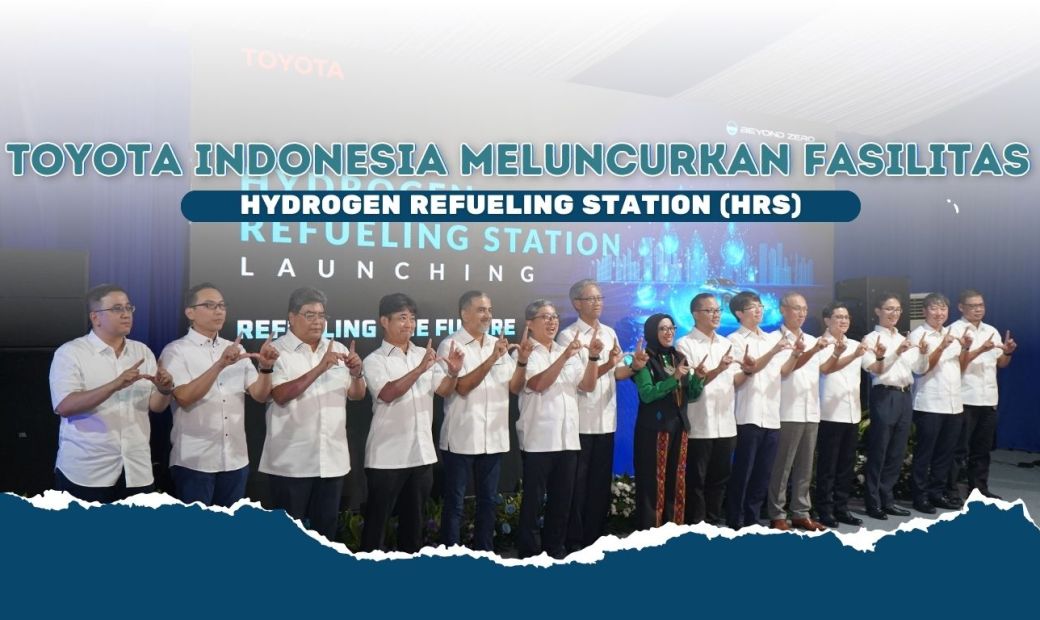Please fill in some of the data provided below to receive the latest Toyota-related news and information in your email.


Karawang, xEV Center (February 11, 2025) - Today, Toyota Indonesia officially launched the Hydrogen Refueling System (HRS) facility located at the xEV Center TMMIN Karawang Plant 3. With the theme "Refueling The Future", this HRS facility takes an investment of more than 35 billion rupiah. The development of this HRS infrastructure is a clear example of collaboration between Toyota Indonesia, the national automotive industry, government, academia, Pertamina, PLN, BRIN, and other stakeholders. The facility focuses on energy resources, national energy security, and sustainable economic growth, especially as Indonesia enters the energy transition era of 2030 and beyond.
At this launch event, several Hydrogen technologies were displayed, including hydrogen grillers, cartridges, hydrogen fuel cell forklifts, and Toyota Mirai as Toyota's iconic Fuel Cell Electric Vehicle (FCEV). Toyota Indonesia's HRS has two types of pressure systems: 350 bar for forklift charging and 700 bar for charging Toyota Mirai vehicles and FC trucks.
Present at the inauguration of HRS Toyota Indonesia were Director General of ILMATE, Ministry of Industry - Dr. Setia Diarta, Industrial Services Policy (BSKJI), Ministry of Industry of the Republic of Indonesia - Andi Rizaldi S.T., M.M., Director General of New, Renewable and Energy Conservation, Ministry of Energy and Mineral Resources of the Republic of Indonesia - Prof. Dr. Eng. Eniya Listiani Dewi, Special Staff to the Ministry of Economic Affairs, Coordinating Ministry for Economic Affairs - I Gusti Putu Suryawirawan, MT, M.M., Minister (Head of Economic Section) Embassy of Japan to Indonesia - Ueda Hajime, Assoc. Prof. Dr. Eng. Muhammad Azis from Tokyo University, representatives from Pertamina and Perusahaan Listrik Negara (PLN), as well as representatives from the National Energy Council (DEN) and the National Research and Innovation Agency (BRIN). In addition, academics from UI, ITB, UGM, ITS, and UNS, as well as representatives from Toyota Motor Corporation (TMC) and Toyota Motor Asia (TMA), along with the management of PT TAM and PT TMMIN.
"We would like to express our gratitude for the cooperation with the government, industry, academia, and all stakeholders who supported the establishment of the HRS facility at the xEV Center of TMMIN Karawang Plant 3 which serves as a public advocacy center for electrification technology in Indonesia. The launch of this HRS facility marks an important step towards clean energy transition, especially with Indonesia's abundant renewable energy resources such as geothermal and hydro for the production of clean hydrogen. The development of HRS infrastructure supports energy security and sustainability in various sectors including industry, energy and hydrogen-based mobility. This is a real step for the national automotive industry towards achieving the NZE 2060 target," said Nandi Julyanto, President Director of PT TMMIN.
The launch of HRS as a future energy facility is also in line with the vision of "Beyond Zero" as Toyota's guideline to implement initiatives towards carbon neutrality through various technological solutions. "Beyond Zero" signifies Toyota's commitment in various strategies as innovative solutions, in order to create a sustainable future. This vision guides Toyota's efforts to achieve carbon neutrality through products, services, and operational activities. Not only does it eliminate emissions, but it also has an impact on environmental sustainability and energy security.
"With this Beyond Zero spirit, Toyota is going further in achieving carbon neutrality with a multi-pathway strategy, such as showing the Toyota Mirai Generation 2 to promote Fuel Cell Electric Vehicle (FCEV) technology in Indonesia. Mirai itself means 'future', generates electricity using hydrogen, and emits only water vapor as its emissions. The vehicle offers not only zero emissions, but also safety, comfort, long range and a charging speed of about 3 minutes. With the abundance of renewable energy sources for hydrogen, it presents a strong opportunity for a greener future," said PT TAM President Director Hiroyuki Ueda.
Pioneer in Human Resources and Hydrogen Ecosystem Development in Indonesia
Through the launch of HRS infrastructure, Toyota Indonesia is also focusing on developing human resources in Indonesia and preparing a workforce that is certified in hydrogen technology. Toyota has been training its employees in hydrogen technology, technical skills, and safety awareness and ensuring they have sufficient knowledge and practical experience.
"People development activities in the development of Toyota Indonesia's HRS mark our efforts as a pioneer in developing qualified human resources, in order to support the presence of the hydrogen ecosystem in Indonesia. We believe hydrogen is an important bridge to achieving clean energy, so qualified human resources must be prepared from the beginning in accordance with our philosophy "We Make People Before We Make Product." Our commitment continues to prioritize people transformation, through the development of experts and then strengthening R&D (Research & Design), especially preparing for the development of hydrogen curriculum and learning tools, will continue to be strengthened as the main foundation for entering the energy transition era," said Bob Azam, Vice President Director of PT TMMIN.
HRS - "Refuelling the Future"
Currently, the government is focusing on maximizing the use of carbon-free renewable energy sources. The presence of Toyota Indonesia's HRS in this industrial area aims to support the development of hydrogen-based automotive and non-automotive industries. The HRS facility reinforces the positive contribution of the multi-pathway strategy, namely the synergy of various low-emission vehicle technologies and electrified vehicles with the utilization of low-emission energy in the era of carbon neutrality. Toyota Indonesia presents a variety of high-tech low-emission vehicles, ranging from ICE & LCGC vehicles that use environmentally friendly fuels, to flexible engines (bio-diesel, bio-ethanol), conversion vehicles, and full electrification vehicles, including HEV, PHEV, BEV, and FCEV as part of emission reduction efforts. "Carbon is Our Enemy."
"Through multipathway technology, Toyota Indonesia will implement all types of vehicle technology according to our principle of "No one Left Behind." This means that all types of technology contribute to reducing carbon emissions. So that if utilized optimally, it will have a positive impact on the automotive industry to its supply chain, which houses more than 300,000 human resources (labor-intensive industry). Ensuring that no one is left behind from future automotive technology," said Nandi Julyanto.
Hydrogen, as the energy carrier and transitional energy of the future, is the lightest and most abundant element in the universe. Hydrogen has great potential to store and transport energy in various sectors, including energy storage, transportation, industrial processes, and power generation. By integrating hydrogen as a low-carbon technology, Indonesia can significantly reduce emissions and accelerate the transition to clean energy to achieve global climate targets.
The use of hydrogen as an alternative energy in various sectors can significantly reduce carbon emissions, because hydrogen is a clean and sustainable energy with a large capacity. In addition, hydrogen can be stored and distributed (transportable). So it is very useful for various sectors. Hydrogen plays a number of strategic roles in the energy transition, including enabling the integration of renewable energy along with large-scale power generation, distributing energy across sectors or regions, acting as a buffer that increases system resilience. As well as helping decarbonize transportation, industrial energy, building heating and electricity, and becoming a renewable feedstock
"For more than 50 years growing together with the people of Indonesia, Toyota strives to provide mobility solutions by presenting a variety of vehicle technologies from the past, present, to future energy technology. This consistency is also supported by the strength of Indonesia as a country with energy resources and energy strength that strengthens the green transportation ecosystem, especially through the development of HRS to realize the Government's decarbonization ideals towards a future without emissions," concluded Bob Azam.
End.
HRS, Hydrogen, Refueling, StationMedia/Journalist Contact : [Memuat email...]
Non Media / Non Journalist Contact : [Memuat email...]

© 2024 Toyota Motor Manufacturing Indonesia. All Rights Reserved.
